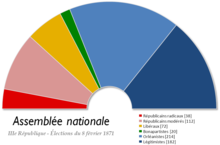
Marie Edme Patrice Maurice de MacMahon, marquis de MacMahon, duc de Magenta, was a French general and politician, with the distinction of Marshal of France. He served as Chief of State of France from 1873 to 1875 and as President of France from 1875 to 1879.
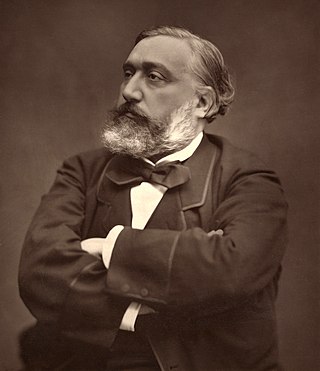
Léon Gambetta was a French lawyer and republican politician who proclaimed the French Third Republic in 1870 and played a prominent role in its early government.

The Minister of Police was the leader and most senior official of the French Ministry of Police. It was a position in the Government of France from 1796 to 1818 and briefly from 1852 to 1853.

The Minister of the Armed Forces is the leader and most senior official of the French Ministry of the Armed Forces, tasked with running the French Armed Forces. The minister is the third-highest civilian having authority over France's military, behind the President of the Republic and the Prime Minister. Based on the governments, they may be assisted by a minister or state secretary for veterans' affairs.

The Minister of War was the leader and most senior official of the French Ministry of War. It was a position in the Government of France from 1791 to 1947, replacing the position of Secretary of State for War and later being merged with the offices of Minister of the Navy and Minister of Air to form a new Minister of the Armed Forces.

The Minister of Information was the leader and most senior official of the French Ministry of Information. It was a position in the Government of France from 1938 to 1974 and no longer exists.

The 16 May 1877 crisis was a constitutional crisis in the French Third Republic concerning the distribution of power between the president and the legislature. When the royalist president Patrice MacMahon dismissed the Moderate Republican prime minister Jules Simon, the parliament on 16 May 1877 refused to support the new government and was dissolved by the president. New elections resulted in the royalists increasing their seat totals, but nonetheless resulted in a majority for the Republicans. Thus, the interpretation of the 1875 Constitution as a parliamentary system prevailed over a presidential system. The crisis ultimately sealed the defeat of the royalist movement, and was instrumental in creating the conditions for the longevity of the Third Republic.

The Chief of the Army Staff is the military head of the French Army. The chief directs the army staff and acts as the principal advisor to the Chief of the Defence Staff on subjects concerning the Army. As such, they ensure the operational preparedness of their service branch, express their need for military and civilian personnel, and are responsible for maintaining the discipline, morale and conduct of their troops. Special responsibilities can be assigned to them in relation to nuclear safety.
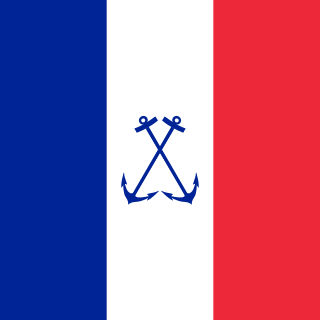
The Chief of the Naval Staff is a French general officer, adviser to the Chief of the Defence Staff for the French Navy and responsible to the Minister of the Armed Forces for preparing the Navy for its engagement. Since 1 September 2023, the Chief of the Naval Staff has been Admiral Nicolas Vaujour.

The Constitutional Laws of 1875 were the laws passed in France by the National Assembly between February and July 1875 which established the Third French Republic.
Events from the year 1871 in France.

Charles Louis de Saulces de Freycinet was a French statesman who served four times as Prime Minister during the Third Republic. He also served an important term as Minister of War (1888–1893). He belonged to the Moderate Republican faction.
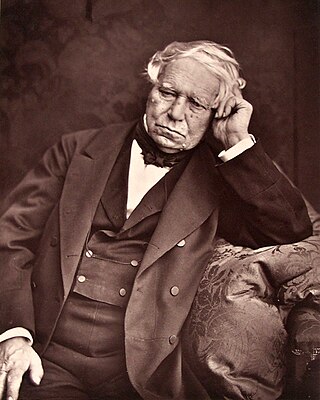
Jules Armand Stanislas Dufaure was a French statesman who served 3 non-consecutive terms as Prime Minister of France.
The deputy prime minister of France is a position which existed at times in the government of France between 1871 and 1958. It was titled vice president of the Council of Ministers, or vice president of the Council for short.

Jean JulesGodefroy Calès was a French politician and physician. He was born on July 24, 1828, in Villefranche-de-Lauragais (Haute-Garonne) and died on November 2, 1899, in Bordeaux (Gironde).
The Ministry of War was the Government of France department responsible for the French Army, the National Gendarmerie and until 1934, the French Air Force. It existed from 25 May 1791 to 31 October 1947, date to which it was merged with the Ministry of the Navy and the Ministry of Air into the Ministry of Armed Forces. It was headed by the Minister of War, occasionally taking various titles.
The Second Cabinet of Jules Dufaure is the 55th cabinet of France and the third of the Third Republic, seating from 18 May 1873 to 25 May 1873, headed by Jules Dufaure as Vice-President of the Council of Ministers and Minister of Justice, under the presidency of Adolphe Thiers.

The First Cabinet of Albert de Broglie is the 56th cabinet of France and the fourth of the Third Republic, seating from 25 May 1873 to 26 November 1873, headed by Albert de Broglie as vice-president of the Council of Ministers and Minister of Foreign Affairs, under the presidency of Patrice de MacMahon.
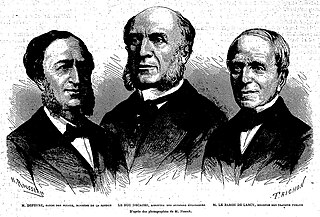
The Second Cabinet of Albert de Broglie is the 57th cabinet of France and the fifth of the Third Republic, seating from 26 November 1873 to 22 May 1874, headed by Albert de Broglie as Vice-President of the Council of Ministers and Minister of Interior, under the presidency of Patrice de MacMahon.

The purge of the French Civil Service between 1879 and 1884, also known as the "revolution of jobs," refers to a series of political measures taken in France by the Republicans at the beginning of the Third Republic. These measures were designed to cleanse the administration, army, and judiciary of their most conservative members. This purge was not the first to be experienced by the regime; others had occurred in 1870, 1871, 1876, and 1877.

